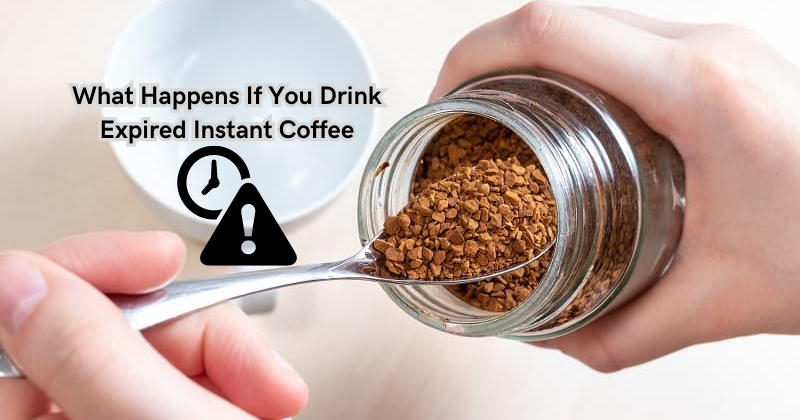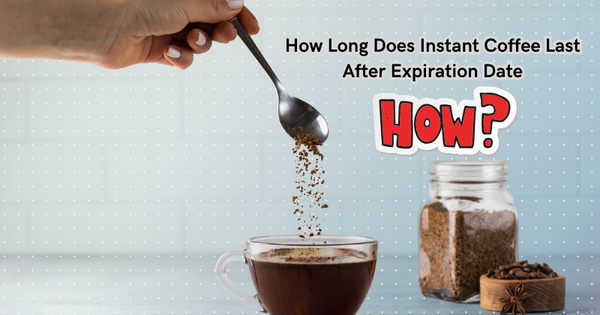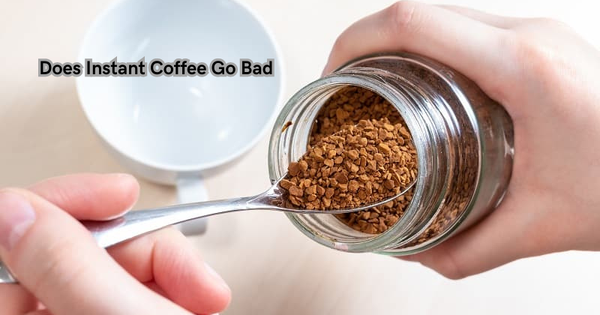Consuming expired instant coffee can have notable repercussions on your health and the quality of your coffee experience. As instant coffee ages, it undergoes chemical changes that can lead to a stale or off-putting taste.
Moreover, the degradation of its components may result in gastrointestinal discomfort, such as nausea, stomach cramps, or diarrhea. Additionally, expired coffee risks developing mold or mycotoxins, which could pose health hazards if consumed. This guide will delve into what happens if you drink expired instant coffee and give tips on how to minimize risks.
Recognizing the potential outcomes of imbibing expired instant coffee underscores the importance of respecting expiration dates and proper storage practices to uphold both personal well-being and the enjoyment of a flavorful and wholesome coffee indulgence.
Does Instant Coffee Expire If Unopened?
Yes, instant coffee can still expire even if it is unopened. While the shelf life of unopened instant coffee may be longer than opened ones, it is not immune to expiration.
Instant coffee typically has a shelf life of 2-20 years, depending on the type and storage conditions. However, this does not mean it will remain fresh and safe to consume for that entire duration.
Factors such as exposure to heat, moisture, and air can accelerate the deterioration of instant coffee, even if it is unopened. In direct sunlight, whole-bean coffee, grounds, and instant coffee can become rancid in a few days.
Therefore, checking the expiration date and properly storing unopened instant coffee in a cool, dry place away from direct sunlight is essential.
How Can You Tell If Instant Coffee Is Expired?
There are several ways to determine if instant coffee is expired. The most obvious indication is the expiration date printed on the packaging. If it has passed, then the coffee is likely past its prime.
Other signs of expired instant coffee include a change in color or odor. Fresh instant coffee should be dark and have a pleasant aroma, but expired instant coffee may appear lighter in color and have a stale or musty smell.
You may also notice a difference in taste. Expired instant coffee can have a bitter or rancid taste due to the breakdown of its components over time. If you detect any off-putting flavors, it is best to stop consuming the coffee and dispose of it.
What Happens If You Drink Expired Instant Coffee?
As mentioned earlier, drinking expired instant coffee can result in unpleasant side effects such as nausea, stomach cramps, or diarrhea. These symptoms are due to the presence of harmful bacteria and mold that may have developed during the coffee's expiration period.
Moreover, consuming expired instant coffee can also affect your overall coffee experience. The taste and aroma may be compromised, leading to a less enjoyable and flavorful cup of coffee.
In rare cases, expired coffee can also contain mycotoxins, which are toxic substances produced by molds.
These mycotoxins can have serious health consequences if consumed in large quantities. Therefore, it is crucial to always check the expiration date and properly store instant coffee to prevent any potential risks.
Tips on How to Minimize Risks When Drinking Expired Instant Coffee
If you accidentally drink expired instant coffee, here are some tips to help minimize potential risks:
- Stop consuming: If you notice any changes in color, odor, or taste in your coffee, it is best to stop consuming it immediately.
- Stay hydrated: If you experience discomfort or mild symptoms after drinking expired instant coffee, make sure to drink plenty of water to stay hydrated and flush out any toxins.
- Consult a doctor: If you experience severe symptoms or are unsure about your health after consuming expired coffee, consult a doctor for medical advice.
- Properly dispose of the coffee: To prevent any potential risks, it is essential to properly dispose of expired instant coffee. Make sure to seal the coffee in a plastic bag before throwing it away to avoid any contamination.
How Can You Extend the Shelf Life of Instant Coffee?
Proper storage is key to prolonging the shelf life of instant coffee. Here are a few tips to help extend the freshness of your instant coffee:
- Store in an airtight container: Once opened, transfer the instant coffee into an airtight container to prevent moisture and air from entering. Opened instant coffee and black coffee can become stale within a week if not stored properly.
- Keep in a cool, dry place: Instant coffee is sensitive to heat and humidity, so it is best to store it in a cool, dry place away from direct sunlight. Coffee beans, grounds, and instant coffee all benefit from cold storage. Ground coffee and instant coffee can last up to two years in the freezer, while whole beans can last up to three.
- Avoid contamination: Use clean and dry utensils when handling instant coffee to prevent any bacterial growth or cross-contamination. For freshly brewed coffee, make sure to clean your coffee maker regularly.
- Follow the recommended consumption period: While instant coffee may not necessarily spoil after the expiration date, it is best to follow the recommended consumption period for optimal taste and freshness.
By following these storage tips, you can help prolong the shelf life of your instant coffee and ensure a better drinking coffee experience.
Creative Ways to Use Expired Instant Coffee
If you have expired instant coffee that is still safe to consume but not suitable for drinking, there are other ways to utilize it. Here are a few creative ideas:
- Baking ingredient: Ground or powdered instant coffee can add depth and flavor to baked goods such as cookies, cakes, and brownies.
- Coffee body scrub: Mix equal parts of ground or powdered instant coffee with coconut oil to create a natural exfoliating body scrub.
- Marinade: Instant coffee can be used as a unique ingredient in marinades for meat or vegetables, adding a smoky and rich flavor.
- Coffee ice cubes: Freeze brewed instant coffee into ice cubes and use them to make iced coffee without diluting the flavor.
These are just a few examples of how you can repurpose expired instant coffee instead of wasting it. Drink coffee or use it as an ingredient; always be mindful of expiration dates and proper storage to ensure the best quality and taste.
How Does The Stale Instant Coffee Taste Different?
Stale instant coffee can have a noticeably different taste compared to fresh instant coffee. Staling refers to the degradation of coffee components, such as aroma and flavor compounds, due to exposure to heat, light, and oxygen.
The longer instant coffee sits unused or improperly stored, the more likely it will lose its freshness and develop a stale taste. This can result in a less aromatic and flavorful cup of coffee, often with a bitter or rancid aftertaste.
Furthermore, the degree of staling can vary depending on the type of instant coffee and its packaging. For example, freeze-dried instant coffee is more susceptible to staling than spray-dried instant coffee due to its higher moisture content.
Can You Use Expired Coffee Grounds?
Expired coffee grounds can still be used as a fertilizer for plants or as an ingredient in DIY beauty products. However, they may not be suitable for brewing fresh coffee as they may have lost their flavor and aroma.
It is best to use freshly ground coffee beans for the best-tasting cup of coffee. If you have expired coffee grounds, it is recommended to repurpose them instead of consuming them for the best results.
Roasted coffee beans can also be used as an ingredient in cooking or baking to add a hint of coffee flavor. Fresh coffee grounds are best for brewing a flavorful cup of coffee, so it is recommended to use them within the recommended consumption period.
FAQs
Is it good to drink expired coffee?
It is not recommended to drink expired coffee as it may have a stale taste and can potentially contain harmful mycotoxins. It is best to check the expiration date and properly store instant coffee for optimal freshness and safety.
What happens if you drink expired Nescafe coffee?
Drinking expired Nescafe coffee may result in a stale taste and potential health risks due to the presence of mycotoxins. It is best to always check the expiration date and properly store instant coffee for optimal freshness and safety. However, if the Nescafe coffee is only slightly past its expiration date, it may still be safe to consume.
Why did my coffee turn black?
If your coffee has turned black, it is likely due to oxidation. This can occur when the coffee beans or grounds are exposed to oxygen for extended periods of time, causing them to lose their freshness and become stale. Proper storage in an airtight container can help prevent this from happening.
What are the side effects of expired coffee?
Expired coffee may contain harmful mycotoxins, which can cause symptoms such as nausea, vomiting, and stomach pain. It can also have a stale taste and lack in quality and aroma. It is best to properly store instant coffee and consume it within the recommended consumption period for optimal freshness and safety.
Conclusion
In conclusion, consuming expired instant coffee can have multifaceted consequences, encompassing both potential health risks and a diminished sensory experience.
The chemical alterations that occur as instant coffee ages lead to a loss of flavor and aroma, detracting from the enjoyment of the beverage.
Moreover, the ingestion of expired coffee may result in gastrointestinal discomfort due to the breakdown of its components or the presence of mold and mycotoxins.
These ramifications underscore the importance of adhering to expiration dates and employing proper storage practices to safeguard both the quality of the coffee-drinking experience and personal well-being.
By recognizing the potential outcomes of imbibing expired instant coffee, individuals can make informed choices that prioritize the preservation of flavor, the avoidance of health complications, and the promotion of a gratifying and safe coffee indulgence.



